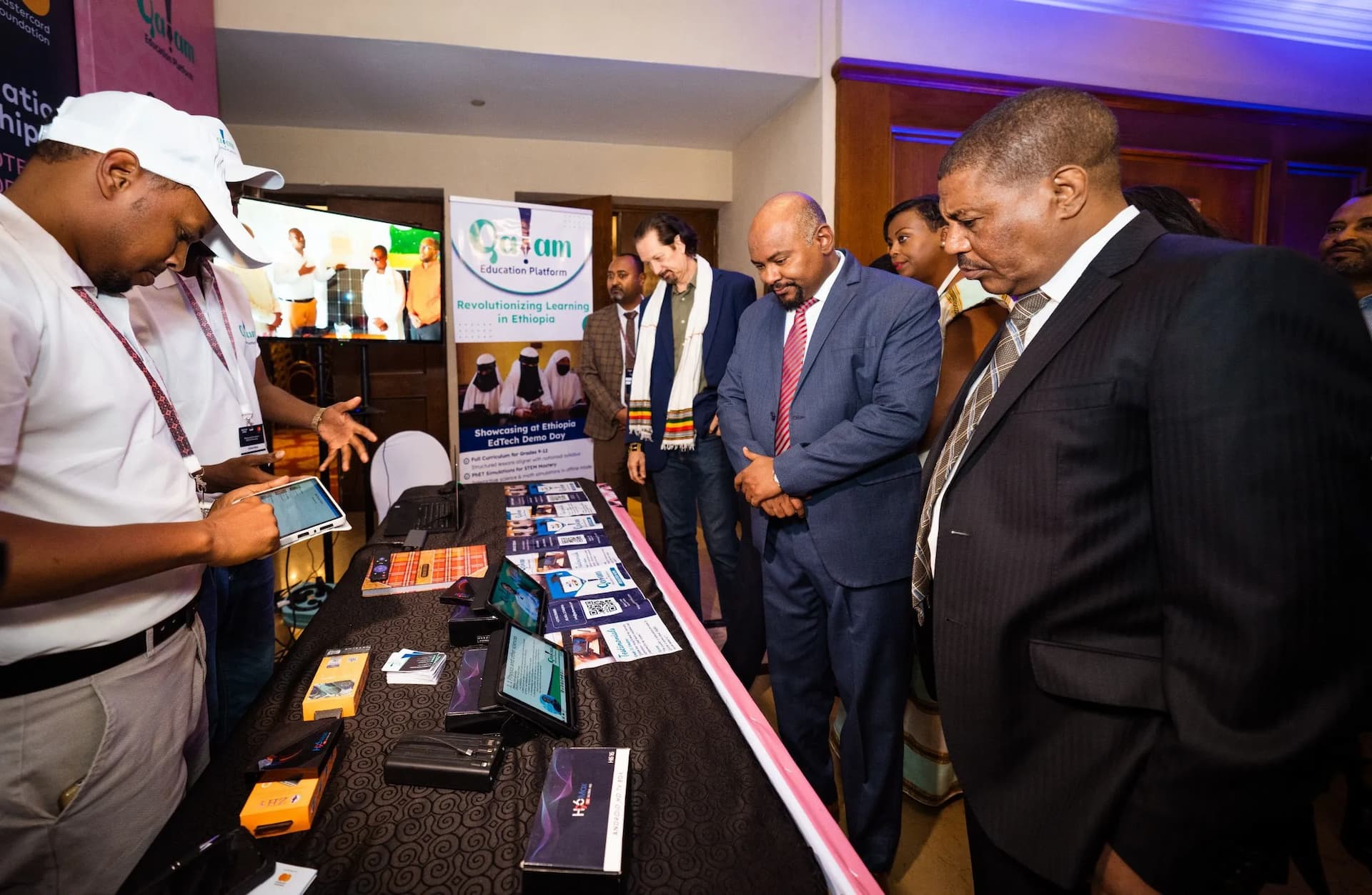Progress for 0 ad
Progress for 1 ad
Progress for 2 ad
Progress for 3 ad

Partner Content
Addis Ababa, Ethiopia

Abdifatah Dayib, born and raised 1,250 kilometers from Ethiopia’s capital in the border town of Ferfer, Somali Region, experienced early on what limited access to education means in practice. After completing Grade 8, he found there were no secondary schools in the district. The only path forward required relocating to Mogadishu, Somalia, where he was able to continue his studies with the support of relatives. He later graduated with a degree in Information Technology from SIMAD University, in Somalia.
“Having missed out on a smooth educational path due to limited access, I became deeply committed to solving this problem for others.” He told Shega, reflecting on the journey that led to the establishment of Qalam Educational Platform.
Qalam, which means pen or pencil in Somali, was initially founded in Somalia, with the goal of providing accessible education through digital tools. It was primarily launched as a platform offering curriculum-aligned video lessons, interactive simulations, and AI-powered quizzes for secondary students. From the beginning, Qalam prioritized access, offering both online and offline modes via preloaded Android tablets and solar-powered TV boxes enabling students in remote or off-grid areas to continue learning without the need for internet or electricity.
What began as an emergency response during the pandemic quickly revealed a broader structural gap. The platform’s growing user base underscored how deep the need was, even before COVID-19. In both Somalia and Ethiopia, students in under-resourced regions were routinely left behind not just because of poor infrastructure, but due to systemic neglect.
In 2023, when Qalam expanded to Ethiopia, it specifically targeted students in the Somali Region, where national exam failure rates are among the highest in the country. Rather than build for urban smartphone users, Qalam focused on the students with the least access.
Since then, the startup has invested 15 million Birr of its own capital into sourcing and distributing offline-capable devices, solar-powered Android TV boxes, which cost approximately $45 each, and Samsung-branded tablets, priced around $145. These devices come preloaded with the full Grade 9–12 curriculum and are bundled with solar kits for schools and households without electricity.
In districts like Ferfer, Qalam also began repurposing old plasma TV screens by connecting them to its Android boxes via HDMI transforming unused government-issued equipment into fully functional digital classrooms. This device-driven, infrastructure-aware model became central to Qalam’s attempt to bridge educational access in less connected areas.
Qalam, which was among the first cohorts of the Mastercard Foundation EdTech Fellowship participants has also seen more traction following its participation in the Fellowship.
“Prior to being selected for the first cohort of the Mastercard Foundation EdTech Fellowship, we had about 2,000 active users in Ethiopia.” recalls, founder Abdifatah.
Within 12 months of participation and with additional support from Reach for Change that number grew to over 10,000 learners. The fellowship played a catalytic role in scaling device distribution, enhancing offline functionality, and deepening partnerships with schools and NGOs in hard-to-reach areas, according to the founder.
Qalam’s business model follows a freemium structure, offering daily, monthly, and yearly subscription plans. However, in many regions, the bundled model pairing devices with preloaded content and a subscription has proven to be the most practical and scalable approach.
This hardware-first strategy has significantly broadened access but also introduced operational complexities. Device upkeep, teacher training, and distribution in remote areas require deliberate coordination. Still, Qalam’s success in low-infrastructure environments underscores a critical insight, designing around constraints may be more effective than waiting for systems to improve particularly in education ecosystems like those in the Horn of Africa.
Looking ahead, the company plans to broaden its content library to include Grades 7 and 8, while also working on features to support students with disabilities. It is exploring collaborations with telecom providers and development partners to scale hardware deployment and make access more affordable for underserved families.
By centering local realities, investing in infrastructure, and staying aligned with national curricula, Qalam is carving out a model that challenges mainstream EdTech assumptions. For Abdifatah, it’s more than a solution, it’s a response to the very gaps he once encountered as a student. The Mastercard Foundation EdTech Fellowship is a three-year program supporting high-potential African EdTech startups to improve access and learning outcomes. In Ethiopia, it is implemented by Reach for Change in partnership with the Mastercard Foundation.
The program provides equity free funding of up to $60,000, technical support, and ecosystem access to help startups scale inclusive, context-relevant solutions. Over three years, the Fellowship aims to support 36 Ethiopian EdTech ventures, helping them reach underserved learners across the country.
👏
😂
❤️
😲
😠
Partner Content
Partner Content is a collaboration between us and our partners to deliver sponsored information that aligns with your interests.
Your Email Address Will Not Be Published. Required Fields Are Marked *